Job security is what so many of us dream about: being able to focus on work without worrying about layoffs, budget cuts or politics. To put time in with a company, work the ladder, and be rewarded for years and effort…
Unfortunately, this kind of job security is an illusion.
Perhaps in decades past employees could enjoy the benefits of seniority and tenure, but those days ended with the Great Recession of 2008. Many people lost their jobs, pensions and their homes that year and since.
It’s a sad story and what’s worse, it’s one that could easily repeat. And it doesn’t even take an economic downturn to flip your professional life upside down. It could be a technological advance, a health scare, a highly political team or management, and more. The factors that affect your job are many and varied – which is why job security is a myth.
Wouldn’t you feel a lot safer if your future was in your hands and not at the mercy of a specific company?
Focusing on job security is just looking at the small picture. Why put your entire future in the hands of one company? Why put all your energy into making sure you stay in the exact position you’re in now for the rest of your career? Focusing on job security isn’t good enough. You need to think BIG picture. Focus on securing your career.
The best part? Career security is totally in your control.
What Is Career Security?
Shifting your focus from job security to career security is the simple act of understanding that you’re in control of your own destiny. You can decide the path you want your career to follow and determine the best route of getting there – with or without your current company. Develop the skills you need to advance and build the network to help you get there. You don’t have to rely on your company or your current position to take you where you want to go – you can get there yourself.
That’s career security.
How to Secure Your Career
There are multiple elements that go into securing your career and they revolve around something we call your professional toolkit.
Your professional toolkit is made up of the skills you’ve developed over the years. This includes your technical skills (software you’ve used or still use, technical capabilities like Excel, HTML, or Photoshop) and other skills you’ve acquired along the way (such as leading a meeting, hiring a team, interviewing, organizational skills, etc.). The unique combination of the skills you’ve acquired over time will set you apart from the rest. And setting yourself apart from the rest is a critical part of securing your career.
But this doesn’t mean you should compete with everyone around you – it means you should compete with yourself. Consider: how can you be the best professional you can be?
Keep a Running List of Your Accomplishments
If your professional toolkit is your baseline, then a running list of your accomplishments is a graph measuring the growth of that baseline. What’s more: it’s a lot easier to maintain your toolkit when you have a concrete list to add to on a regular basis. (Starting from scratch is never easy – especially when we are required to do more and more every day at our jobs.)
If you don’t already have a list like this, start one now. Focus on the past quarter. What projects were you a part of and how did you contribute? Did you set goals for yourself and how did you do on them? What goals were set for you by your managers and how did you do with them? When you put all of this on paper for the first time, you’ll quickly understand that you’re probably doing a lot more than you realized. You’ll also see areas you could improve on and bright spots to focus on.
This list is not just useful for yourself – it’s really handy when it comes time for that annual review! Instead of waiting to hear how you did, you can flip the script and show what you’ve done, what you’ve learned, and be able to ask for support in areas you need help with (either through having more teammates to work with or through advice/learning that your manager can help you with). This will also be enormously useful in validating your request for a raise or promotion.
Remember, controlling your own destiny is the objective, so having a comprehensive list is just another step in helping you achieve that. The visibility you have into your own skills, expertise, and accomplishments works in two ways:
- It gives you the confidence you need to push for more and take that leap to the next job, company, or career (since we often doubt, forget, or dismiss what we know).
- It helps you articulate what sets you apart and how you’re a fit for the positions you apply for. The more familiar you are with your unique set of skills, the better you can discuss them in an interview or communicate them on a resume (or simply talk about them at a networking event).
Keep Moving Forward
It’s an unfortunate reality that job security isn’t what it used to be. But that fact shouldn’t scare you – it’s empowering! Your future is in your control. Instead of a company or industry defining your career track (your life journey), you get to define it. You get to define your direction. Remember: You can’t get where you want to go without knowing where you’ve been (and where you don’t want to return to). Use your professional toolkit, complete with your list of skills and accomplishments, to help draw the map.
Drawing your own map – now doesn’t that sound a lot nicer than following someone else’s?

